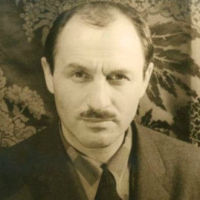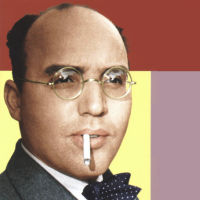Just occasionally, opera takes on social issues, not as high-minded fiction like Beethoven’s Fidelio,
but as direct polemical engagement with current events. Notable among such attempts in the earlier Twentieth
Century are the works inspired by the playwright and activist Bertolt Brecht: the Threepenny Opera and
Mahagonny by Kurt Weill, and (indirectly) The Cradle Will Rock by Marc Blitzstein. By their nature,
such works teeter between the genres of musical theater and true opera, but the Weill works at least have lasted
well beyond the times out of which they sprang.
American composer Philip Glass has chosen a different approach. His "Portrait Trilogy"—Einstein on the Beach,
Satyagraha, and Akhnaten—focus on real people whose life and ideas had real social consequences, seen from
the perspective of posterity. For the politics of satire and agitation, he substitutes an almost timeless ritual
of contemplation, in which the meaning of his protagonists’ lives is allowed to permeate the awareness of the
audience by a kind of musical osmosis. rb.
The plots of the two main operas to be sampled in class, The Rise and Fall of the City of Mahagonny and
Satyagraha are long and complicated. As we shall be watching only relatively short portions of each, you
should be able to get what you need to know from the class itself. However, those wanting to read up in advance
can find synopses by clicking the following links:
Mahagonny and
Satyagraha.
The only videos shown in class that are available on YouTube are the five marked with *asterisks, though the
Tim Robbins film Cradle Will Rock has Spanish titles, and the clips of "Nickel under the foot" have none. Only
one scene from the Madrid Mahagonny is available, but I do
include an excellent and recent (April 28) Mahagonny from Parma, with an international cast and English titles.
I am also throwing in a complete video of the last Becht/Weill collaboration, The Seven Deadly Sins, a 45-minute
opera-ballet that I think you will find highly entertaining. And while very few live performance clips of The Cradle
Will Rock are out there, I can add two documentary links: a detailed article by Scott Miller, and a video of the
original producer, John Houseman, explaining the extraordinary conditions of the first production. rb.
| |
|
|
|
|
|
| IMAGES |
The thumbnails below cover the slides shown in class. Click the
thumbnail to see a larger image.
Click on the right or left of this picture to go forward or back,
or outside the border to close. |
 | |
 | |
 | |
 | |
 | |
 | |
 | |
 | |
 | |
 | |
 | |
 | |
 | |
 | |
 | |
The class contains work by the following composers, given here in chronological order.
For bios of other composers in the course, click here.
 |
Marc Blitzstein (1905–64). American composer.
Although he studied with Schoenberg, Blitzstein's mature work is diatonic with injections of popular music and
jazz, placing him somewhere between Kurt Weill and Leonard Bernstein. His opera The Cradle Will Rock
(1937) is testament to his Socialist leanings; his Regina (1947), based on The Little Foxes by
Lillian Hellman, is still occasionally produced.
|
 |
Bertolt Brecht (1898–1956). German dramatist.
Brecht's importance to opera rests mainly on his collaborations with Kurt Weill between 1928 and 1932:
The Threepenny Opera, Happy End, Mahagonny, and The Seven Deadly Sins. A Communist, he fled
the Nazi régime, but returned after the War to found the celebrated Berliner Ensemble in East Berlin.
|
 |
Philip Glass (b.1937). American composer.
Glass, who was born in Baltimore and studied at the Peabody Prep, is one of the founders of Minimalism and, with
John Adams, its leading composer of opera. Prominent among his 15 operas is a trilogy about significant figures from
history: Einstein on the Beach (1976), Satygraha (1979, about Ghandi), and Akhnaten (1983, about
the Egyptian pharaoh of that name).
|
 |
Kurt Weill (1900–50). German American composer.
Weill became famous in Berlin for his collaborations with Bertolt Brecht, among them The Threepenny Opera
(1928, a satirical adaptation of John Gay's The Beggar's Opera, see above) and the political opera The Rise
and Fall of the City of Mahagonny (1930). Fleeing Nazi Germany, he eventually settled in New York in 1935, finding
new fame on Broadway, but also writing more operatic fare such as Street Scene (1946, with Langston Hughes).
|



















